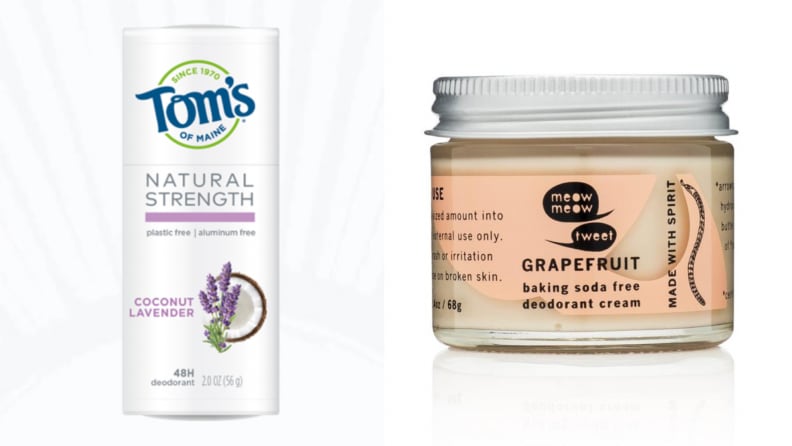Should you make the switch to natural deodorant?
Don't sweat it! Here’s what you need to know.
Products are chosen independently by our editors. Purchases made through our links may earn us a commission.
Natural deodorant. You've heard of it, you've read about it, you may have even dabbled into it. There's no denying its existence, and with the rise of consumer awareness surrounding beauty and self-care routines, a market (and, frankly, a demand) has risen for natural deodorants. But let's back up. What exactly is natural deodorant? What characteristics does it possess that make it natural? And what's wrong with traditional deodorants, anyways (if anything)?
To answer these questions, we spoke with board-certified dermatologist Dr. Azza Halim and plastic surgeon Dr. Konstantin Vasyukevich of New York Facial Plastic Surgery. If you're looking to make the switch to natural deodorant, here's everything you should know.
How does deodorant work?
First, a lesson on sweating. "Sweat is mainly made up of water mixed with salts, with its main purpose to help control our body's internal temperature and cool us down," says Vasyukevich. Our sweat glands work full time to maintain a healthy body temperature, but surprisingly, sweat itself isn’t the root cause of B.O.—rather, it's the bacteria on the skin mixing with the sweat that causes a smell to form.
That's where deodorant can come in. Deodorants often contain antibacterial ingredients and/or alcohol, making them antimicrobial, increasing the skin's acidity levels to kill the bacteria that causes that foul smell, says Halim. They also usually contain fragrances, which are added for the purpose of masking malodor. The main function of antiperspirants, on the other hand, is to block the sweat glands from releasing sweat in the first place. This means there's no environment that could lead bacteria to mix with sweat to create body odor. Antiperspirants are also regulated by the FDA as a drug because they affect the function of the body. Often, mainstream products contain both deodorant and antiperspirants for a double whammy against body odor.
What are the concerns with traditional deodorant?
One of the main reasons people make the switch to natural deodorants is because of the list of chemicals that may cause skin irritation (moisturizing ingredient propylene glycol and antibacterial additive triclosan being the main offenders, according to Halim). Traditional chemical-based deodorant formulas also often contain ingredients that have been studied for the potential health concerns they pose. "These chemicals range from parabens, which may interfere with the body's production of estrogen, to phthalates, which may interfere with the body's production of testosterone," he adds.
There's also been some controversy surrounding antiperspirants, namely their aluminum content, which is used to provide a gel barrier on the skin to block the sweat glands. Dissidents say that the skin may absorb the ingredients found in aluminum, and that this may cause changes in the estrogen receptors of the breast cells, says Vasyukevich. The American Cancer Society has refuted this theory, pointing to the fact that "there are no strong epidemiologic studies in the medical literature that link breast cancer risk and antiperspirant use." The organization does, however, cite a study where traces of parabens were found in samples of breast cancer tumors. Still, there haven't been any studies directly linking parabens to health issues, and parabens in personal care products remain FDA-approved.
What is natural deodorant?

Natural deodorants use ingredients like coconut oil and baking soda to help neutralize odors.
Think of natural deodorants like grocery-store produce: There are organic and non-organic options, with customers on either end of the spectrum. Instead of using aluminum- and alcohol-based ingredients, natural deodorants use ingredients people believe to be gentler and more “natural” in the formulas. Some common ones you may find are baking soda, which can absorb sweat; coconut oil, which is used as a binder; and essential oils for fragrance. In addition, charcoal and magnesium are also often used for their antimicrobial effects and to reduce odor-causing bacteria.
It's important to note that just because something is labeled as “natural" doesn’t necessarily mean it’s better or safer—it can still contain ingredients that are irritating or allergy-causing. If you're looking to make the switch to natural deodorant, steer clear of the word "fragrance" on the label, as this is an umbrella term that may include a number of potentially irritating ingredients.
What should you know before switching to natural deodorant?

It may take a few weeks before your body fully transitions from aluminum-containing products.
Sweating is a natural process, and you may have to fight through a few weeks of odor when making the switch from an antiperspirant or deodorant to a more natural option. This is often referred to as a "purge." "While going through a 'purge,' the body is cleansing itself of stored chemical toxins such as aluminum," explains Vasyukevich. "Once your body clears the aluminum, your skin now begins regulating its body heat on its own and rids itself of the added toxins it has been harboring through the form of sweat. Not long after is when your body odor will be at its most potent." The purging process lasts about two to four weeks, with week three being when your body has flushed out the toxins and is ready to start adjusting itself to your new routine.
To make the purging period less unpleasant, Halim says that using an activated charcoal or clay mask just like you do on the face to draw out toxins can be helpful try the top-rated Pacifica Underarm Detox Scrub. Also, drinking plenty of water and maintaining a healthy diet—some suggest extra citrus fruits—can be helpful in minimizing a foul odor, says Vasyukevich.
Which natural deodorants actually work?

Native doesn't contain any aluminum, instead containing baking soda to help absorb sweat.
One of Reviewed's writers tried Native, and fell in love with its light fragrances, stating it didn't stain her clothing and left her feeling fresh. Amazon shoppers also swear by Tom’s of Maine Long-Lasting Natural Deodorant, raving about the smooth-applying formula and the gentle, earthy scents of lavender and tea tree oil. If you prefer tried-and-true brands, you can even find an aluminum-free version of Dove and Degree.


